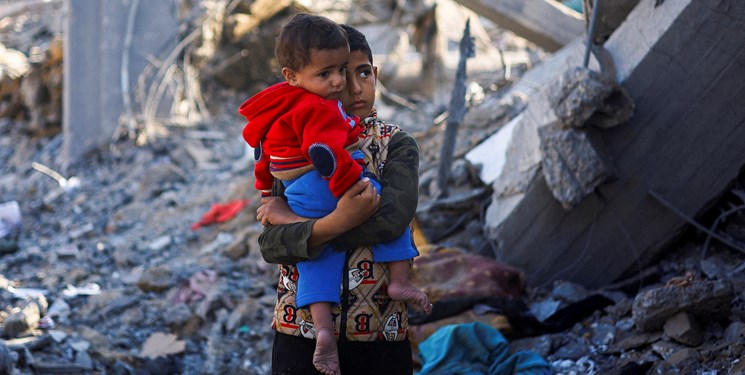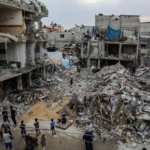In Gaza, the days when Ramadan brought along with its arrival festive lights and tantalizing aromas of traditional cuisines are long gone. As you read this, the streets of Gaza, which typically would be adorned with bright lights, and the eager anticipation of iftar gathering sadly now bear the weight of uncertainty. People now gather not around tables filled with abundance and loved ones but with meager portions, counting blessings for being part of those who have survived the day. The once bustling markets now echo with emptiness, the stalls devoid of spices and sweets.
The holy month of Ramadan is here once again, and Muslims around the world are on a journey of spiritual purification through fasting, prayer, and compassion. For the besieged people of Gaza, this year the sacred month arrived not with its usual jubilation but under a veil of subdued contemplation, overshadowed by a harrowing humanitarian crisis fueled by years of conflict and blockade.
Amidst the rubble and echoes of violence, the resilience of the Gazans is put to the ultimate test as they strive to observe Ramadan’s traditions while struggling with scarcity, displacement, and the ever-present spectre of hunger.
The other day, Dr Mustafa Elmasri, the respected psychotherapist and psychiatrist in Gaza, posted on his X handle, “Two consecutive nights without proper sleep. Echoes of women’s cries over their lost children keep banging my head. I tried all my psych tricks, but nothing works.” These three short sentences took my entire thoughts back to Gaza, and that was when these reflections became my constant companions. I have been thinking about how the people of Gaza are coping during this month of Ramadan. Then the googling online and searching on X for recent stories coming out of Gaza started, and of course, as expected, they were filled with agonies. The impact of the conflict extends far beyond the physical destruction of buildings and infrastructure; it has also unleashed a mental health pandemic.
The Adhan, the melodious call to prayer, a symbol of peace and devotion, now serves not only as a call to prayer but also as a poignant reminder of the enduring spirit of Gaza’s people. As its echoes reverberate through the battered streets, it is a defiant anthem of resilience—a testament to the unshakable faith that sustains them even in the darkest of times.
As the sun sets and the call to Maghrib prayer signals the end of the day’s fast, the breaking of bread is no longer just a ritual but a moment of gratitude for surviving the day. The laughter and chit-chat that once accompanied the iftar meal have been replaced with a reflective silence as families share in the blessings of togetherness and the hope for peace.
Traditional dishes like maqluba and kunafa, once shared among neighbours, have become luxuries that few or none can afford. The absence of these culinary traditions is not just a loss of flavour but a loss of cultural identity—a profound grief that underscores the deep scars of this conflict.
The war has created a spiraling crisis, with 1.7 million people displaced and 2.2 million at imminent risk of famine. The damage to the infrastructure in Gaza is extensive, with over 60% of housing damaged and roughly 17,000 children separated from their parents or unaccompanied. The statistics paint a grim picture of the humanitarian crisis in Gaza. According to UNICEF, since October 7, Israel has killed more than 13,000 children, and thousands more have been injured or stuck under rubble.
Aljazeera reported that starvation is getting worse in Gaza, where 31% of Palestinian children under two years old are suffering from acute malnutrition, a percentage that has doubled since January. Catherine Russell, UNICEF’s Executive Director, stated in her interview with CBS, and I quote, “We haven’t seen that rate of death among children in almost any other conflict in the world.” She further said that she has been in the wards of children who are suffering from anaemia and malnutrition; the whole ward was quiet. Because the children, the babies don’t even have the energy to cry.
The scarcity of basic provisions forces many to resort to unconventional measures, with some even resorting to foraging for wild herbs and greens to supplement their meager supplies. The United Nations has reported that every resident of Gaza is at risk of crisis-level food insecurity, and aid, the lifeline for so many, is scarce and often falls short of the dire needs of the hungry.
The international response to the crisis, especially during this Ramadan period, has been a complex web of political negotiations and humanitarian efforts. The UNRWA is wrestling with the challenge of providing Gaza with aid, reporting significant challenges in delivering aid, with only a fraction of the required trucks able to enter Gaza on any given day.
With a humanitarian crisis escalating by the day, and a population teetering on the brink of starvation, the need for rapid humanitarian aid is growing with each passing moment. Powerful voices from different walks of life, like politicians, religious leaders, actors, athletes, activists, the UN Secretary General, and most recently, the UN Security Council, after 171 days, have called for an immediate ceasefire to honour the spirit of this holy month and ensure the delivery of life-saving aid.
Despite these overwhelming challenges, the people of Gaza cling to their faith as a steadfast anchor within this chaos. As they abstain from dawn till dusk, their fast is not only a reflection of piety but also a profound display of solidarity in the face of scarcity—a heart-wrenching reminder that even when the body is denied sustenance, the spirit can still feast on its faith. It is this unshakable faith that sustains them, that whispers of a dawn yet to come, where peace might once again settle over the land like the gentle breaking of the fast.
As the Adhan weaves through the battered streets, the faithful gather, their prayers rising like incense from the ashes of desolation. Here, in the shared silence of devotion, they find a collective strength, a bond that fortifies them against the relentless tide of hardship. The people of Gaza look to the international community not just for relief, but for a resolution that brings lasting peace. The data and statistics underscore the urgency of the situation, calling for an immediate ceasefire and effective action to alleviate the suffering of Gazans.
In this sacred month, the echoes of Adhan resound through the rubble and destruction, calling the faithful to remember their resilience, their faith, and the hope that sustains them through the darkest of times. It is a battle not merely physical but spiritual, where the very essence of Ramadan—a time of reflection, unity, and renewal—hangs in the balance.
As we observe Ramadan, let us turn our thoughts and prayers towards the people of Gaza, especially in these last 10 days. Let us raise our voices to ALLAH SWT to ease their affairs and, in solidarity, call for an end to the violence and a renewed commitment to peace and recovery. For it is only through collective action and determination that the echoes of the Adhan will once again ring out, heralding a dawn of hope and restoration for the land and its resilient people.
Dr Halimah wrote from Kano and can be reached via [email protected]

 Join Daily Trust WhatsApp Community For Quick Access To News and Happenings Around You.
Join Daily Trust WhatsApp Community For Quick Access To News and Happenings Around You.

